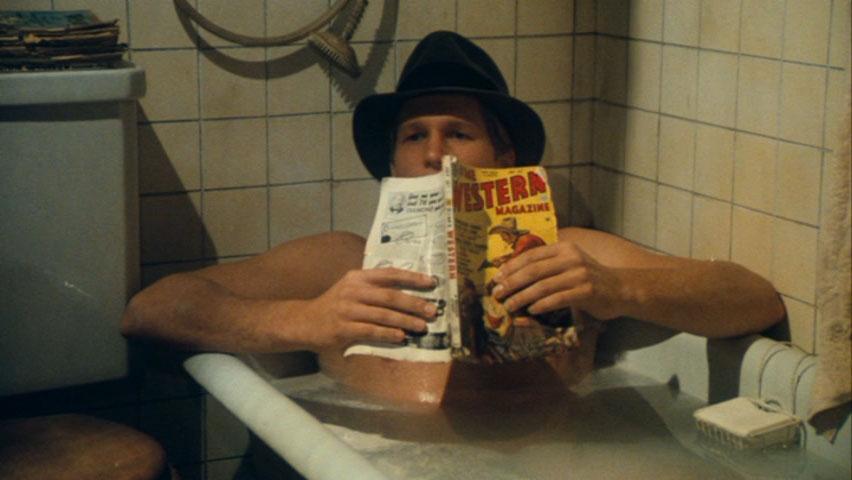It’s always a pleasure to learn one is wrong for the right reasons. Until writing this column, I had been under the impression that Hearts of the West, a truly wonderful western comedy from 1975, was unavailable on DVD. Now, I learn that it has been out there since summer of 2011. Having hoarded a poor-quality VHS for over a decade, I have already purchased a remastered DVD copy online and, if God is good, it’s winging its way to me now. Find it, buy it, love it.
Hearts of the West is the story of Louis Tater (Jeff Bridges), a farm-boy who dreams of becoming a western novelist like his hero, Zane Gray (1872-1939). Tater is the ultimate dreamer – everything that crosses his consciousness becomes fodder for another ‘yarn.’ His dream of the West is also a refuge from his family, which is largely made up of louts who laugh at him.
It seems, though, that the louts will have the last laugh when Tater leaves home to visit the campus of his mail-order writing school, the Titan Correspondence School. Instead, he finds a series of post office boxes in the middle of the trackless waste. And to add insult to injury, Tater is attacked by the two swindlers running the school (Richard B. Shull and Anthony James). Tater makes his escape in their car; little knowing that he has also accidently ridden off with their stolen money.
Tater is lost in the desert when he is rescued by cowboy actor Hoard Pike (a glorious Andy Griffith), in the middle of nowhere with a film crew from Tumbleweed Productions. Next thing you know, Tater is being groomed for B-movie stardom by nutty director Bert Kessler (a hilarious Alan Arkin) and romanced by the script girl Charlie Trout (Blythe Danner, never more beautiful).
Of course, the villains from the Titan Correspondence School have been following Tater … and a showdown is inevitable.
Hearts of the West, written by Robert Thompson and directed by Howard Zieff (1927-2009), vanished without a trace upon its initial release. It was briefly a television staple (where your correspondent saw it as a boy), but even then it quickly vanished from sight. That this is the case strikes me as remarkable because Hearts of the West is one of the sweetest, most affecting and warm-hearted movies to emerge from that turbulent decade.
Jeff Bridges (born 1949) delivers a wonderfully fresh performance as the naive (and not terribly bright) Tater. That an actor so good looking and athletic would throw himself into such a nebbishy role speaks volumes about his self-confidence. Bridges never winks at the audience – “guys, I’m not really this dense” – and because of that commitment, his Tater is a fully-developed and realized comic creation. It’s a great pity that Bridges (unlike is father, Lloyd Bridges) did not come into his maturity during an age that made movie westerns of any significant value: he might very well have been one of the great figures of the genre. His performance is all the more touching when seen contrasted to his recent turn as the aging Rooster Cogburn in the remake of True Grit.
Griffith (born 1926), who made a career out of folksy, is perfectly cast as Pike. This wonderful actor seemed to run out of steam in the early 1970s and that’s a shame because even his most genial performances contain shades of gray. Though not as dynamic as his role in A Face in the Crowd (1957), Hearts of the West may be Griffith’s finest screen turn.
Hearts of the West is ultimately a coming of age story, and Tater learns from the many disappointments he encounters on the trail. Heroes are not always what they seem, dreams vanish and fade away, and even love given and received sometimes has a price.
Most movies about Hollywood eventually become acidic, but Zieff balances the tart with sweet. Hearts is a Valentine to an earlier era of screen western, and the game Hollywood Blvd. cowpokes who made them. But more important than that is writer Thompson’s evocation of Western longing. Many people have felt the pull of the West – remember that cowboy artist Charlie Russell first learned of the West in dime novels about Buffalo Bill before lighting out to see that vanishing world for himself. The West has always been about loss and longing, and in a gentle, comic way, Hearts of the West addresses both. Tater, like many before and since, goes looking for the West and, instead, finds himself. We fill the wide and sprawling spaces of the West with our deepest selves, and sometimes the experience is bitter and sometimes it’s sweet. Hearts of the West is both. A masterpiece.
